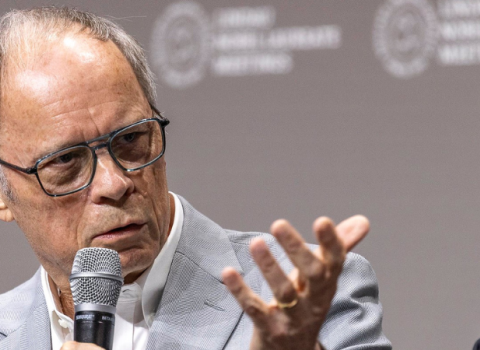They will soon offer 20 joint doctorates as part of a strategic partnership, but that’s not all KU Leuven and the University of Edinburgh have planned. We asked Rector Luc Sels for the details. “If we want to stay part of the international top, we have to be willing to invest now.”
He calls the University of Edinburgh ‘a big fish in a small pond’ and during the rest of our conversation, too, Rector Luc Sels has nothing but praise for his Scottish colleagues. “Edinburgh is by far the main player in Scotland, and they rank 30th in the Times Higher Education ranking, which shows they’re among the world's top players in academia.”
Many different ties
What exactly does the partnership between KU Leuven and Edinburgh entail?
Rector Luc Sels: “Firstly, Leuven and Edinburgh are both investing two million euros in twenty joint doctorates on, among other things, circular economy, energy and society, vascular biology, and medical and health humanities. That's quite something, but the partnership entails much more than that.”
“Did you know, for instance, that our researchers published nearly 500 joint papers between 2015 and 2019, and that Leuven and Edinburgh have already landed thirteen joint Horizon 2020 projects?”
“Apart from this, my Scottish counterpart – Principal Peter Mathieson – and I both attach a great deal of importance to a strong embedding in international networks, and we support each other in this. KU Leuven lobbied for Edinburgh to become a member of UNA Europa, and their membership is now creating new opportunities for cooperation in terms of education. Edinburgh managed to get us into the global network Universitas 21, in which they’re experimenting with alternative forms of student mobility, for instance. And we remain close partners in LERU as well.”
Our collaboration with Edinburgh is a good example of how you can create various ties that make for an unbreakable partnership by focusing on different aspects and by taking each other in tow in multiple networks.
“Aside from education and research, there are many other fields that bring Leuven and Edinburgh together. For instance, Edinburgh is very interested in how we collaborate with the university colleges within the KU Leuven Association, because they’re thinking of doing something similar in Scotland. Technology transfer is an obvious strength of KU Leuven as well, and we get a lot more resources from working with industrial partners. Conversely, we’re inspired by how Edinburgh shapes itself as a global player, their active alumni outreach, and how they shape the relation between the management of the University and the colleges.”
Did you know...
- ... that 19 Nobel Prize laureates have a link with the University of Edinburgh, including Peter Higgs (yes, the particle one)?
- ... that former British Prime Minister and Nobel Prize laureate Winston Churchill was once Rector there, as was Alexander Fleming, who won the Nobel Prize for his discovery of penicillin? The function of Rector in Edinburgh is merely ceremonial, by the way: the Scottish counterpart of our Rector is a Principal.
- ... that the University of Edinburgh is the birthplace of Dolly the sheep, the world’s first clone of an adult mammal?
“University development cooperation is another domain in which we’re joining forces. Like KU Leuven, Edinburgh has an outspoken interest in Ethiopia, and the University of Addis Abeba is an important partner for both of us. With UNA Europa, KU Leuven and Edinburgh also support the possibility of collaborating on a type of UNA Africa, allowing the European partners to connect with the leading African universities.”
“The partnership between our University and Edinburgh takes on many shapes, which illustrates my view on priority partnerships of the future: if they’re based on a single element – only joint doctorates, staff mobility or student mobility, for instance – they’ll quickly fade out. I think that our collaboration with Edinburgh is a good example of how you can create various ties that make for an unbreakable partnership by focusing on different aspects and by taking each other in tow in multiple networks.”
Vulnerable because of Brexit
Very soon, Edinburgh will no longer be a European university. Did the Brexit deadline accelerate the collaboration between Leuven and Edinburgh?
Sels: “Absolutely. There's a lot at stake, and Scotland has always been opposed to Brexit. As a leading university in Scotland, Edinburgh was much quicker and more decisive than other LERU partners in the UK to connect with potential partners on the European continent. As a result, we're seeing a triangle emerge between Leuven, Leiden, and Edinburgh. For Edinburgh, it's also about more than simply having access to Horizon 2020 and other European research funds: it’s clear that they’re interested in much more than research funding when concluding new partnership agreements.”
Talking about European research funding: the British top-level universities are traditionally the ones landing most of the projects. Some might say that Brexit is actually a good thing for universities on the continent: less competition, meaning more money for our researchers?
Sels: “It's a misconception that Brexit is only a threat to universities in the United Kingdom. Let me use Horizon 2020 as an example. Traditionally, Oxford and Cambridge scoop up the highest number of projects, while University College London, Copenhagen, and KU Leuven play leapfrog over the third, fourth, and fifth position. But this doesn't mean that we automatically move to the first or second position with the British competition gone, because the links between the universities in the top 5 are extremely pronounced. If the position of the British universities weakens, this also entails risks for us.”
"All in all, I have a negative outlook on the impact of a hard Brexit on the Flemish universities.” | © BelgaImage - Zumapress - Rob Pinney
“Around 60% of our European projects that have been approved since the start of Horizon 2020 include at least one British partner, and together account for about 122 million euros. This immediately shows the meaning of vulnerability, especially in a scenario in which the United Kingdom would no longer compete in Horizon Europe, the successor of Horizon 2020. At the moment, the UK gets a lot more out of the European research funds than it invests, and we benefit from this thanks to the many ties we have with British universities. If the United Kingdom no longer has access to this money, it could also weaken our position.”
“Or take Marie Curie fellowships, for instance. Here as well, it's not clear whether a hard Brexit would be in the best interest of KU Leuven. It's true that there will probably be a bit more opportunities for individual researchers if they no longer have to compete with their British counterparts, but there will also be fewer resources to begin with, without the contributions of the economic power that is the UK. All in all, I have a negative outlook on the impact of a hard Brexit on the Flemish universities.”
“That's why we shouldn't let the relationship between KU Leuven and the British universities weaken. We also have to prevent that British universities, under the pressure of the Brexit movement, shift their focus back to countries outside of Europe – Australia, Canada, the US, or China. In recent years, Europe has become a third major academic powerhouse, alongside the US and China, and this is partly due to the leading British universities.”
What does Brexit mean for KU Leuven students who want to study in the United Kingdom?
Sels: “Brexit will be a major challenge for higher education, beginning with the complete uncertainty regarding tuition fees for international students. These are currently fairly reasonable in Scotland, but it may well be that the fees will soon increase because the government or the universities want to compensate for the partial loss of European research funds, for instance.”
“And what about exchange programmes such as Erasmus? This uncertainty is also one of the reasons why we wanted to include Edinburgh in UNA Europa: if we want to build a European university with multiple campuses that offer a (partially) joint curriculum, we want a British member to be part of this. And seeing as we’re already collaborating in so many different fields, it also becomes easier to conclude separate agreements on, for instance, the number of reserved spots for exchange students, tuition fee waivers, etc. This is extremely important for our students.”
"If we want to stay part of the international top, we have to be willing to invest in sustainable strategic partnerships." | © KU Leuven - Rob Stevens
All part of the plan
How does the partnership with Edinburgh fit in with the broader strategy of KU Leuven?
Sels: “The partnership fits in with our general pursuit of excellence in research and education. A lot has been accomplished in recent years, but two leverage projects haven't reached their full potential yet, in my view. The first is the recruitment of top talent. We want the best researchers, whether they come from our own small region or from abroad. In the latter case, the language requirements imposed by the Flemish government form a major hurdle. The second leverage project is concluding strategic partnerships.”
“KU Leuven has always had partners, of course, but we need to raise the bar: we’re aiming for the Champions League now. I have emphasised this from the very beginning: we should look at institutions on the same level or higher, and focus more on international networks. We're busy doing both right now. And whereas partnerships in the past used to focus on student and staff mobility, we now also want to work on structural research cooperation and co-investments. The twenty joint doctorates with Edinburgh are already a good example of this.”
“If we want to stay part of the international top, we have to be willing to invest in sustainable strategic partnerships. The academic landscape is constantly becoming more and more international. Not accepting and following this process is simply not an option.”
WHAT YOU NEED TO KNOW ABOUT STRATEGIC PARTNERSHIPS AT KU LEUVEN
The partnership between KU Leuven and the University of Edinburgh is part of the broader framework for Strategic Partnerships. This framework was recently developed at KU Leuven to identify suitable new partners and assess existing partnerships.
There are three types of Strategic Partnerships:
- Priority Partnerships for cooperation in terms of research, among other things through joint doctorates (as in the case of Edinburgh) and seed funds for co-funding of projects; they also involve collaboration in terms of education and student mobility.
- Global Exchange Partnerships for student mobility;
- UNA Europa, an alliance of universities that, together, want to create a European university of the future, based on a model with multiple campuses and a (partly) overlapping curriculum.
This article was published on 24 January 2020 by KU Leuven





 A unique international forum for public research organisations and companies to connect their external engagement with strategic interests around their R&D system.
A unique international forum for public research organisations and companies to connect their external engagement with strategic interests around their R&D system.